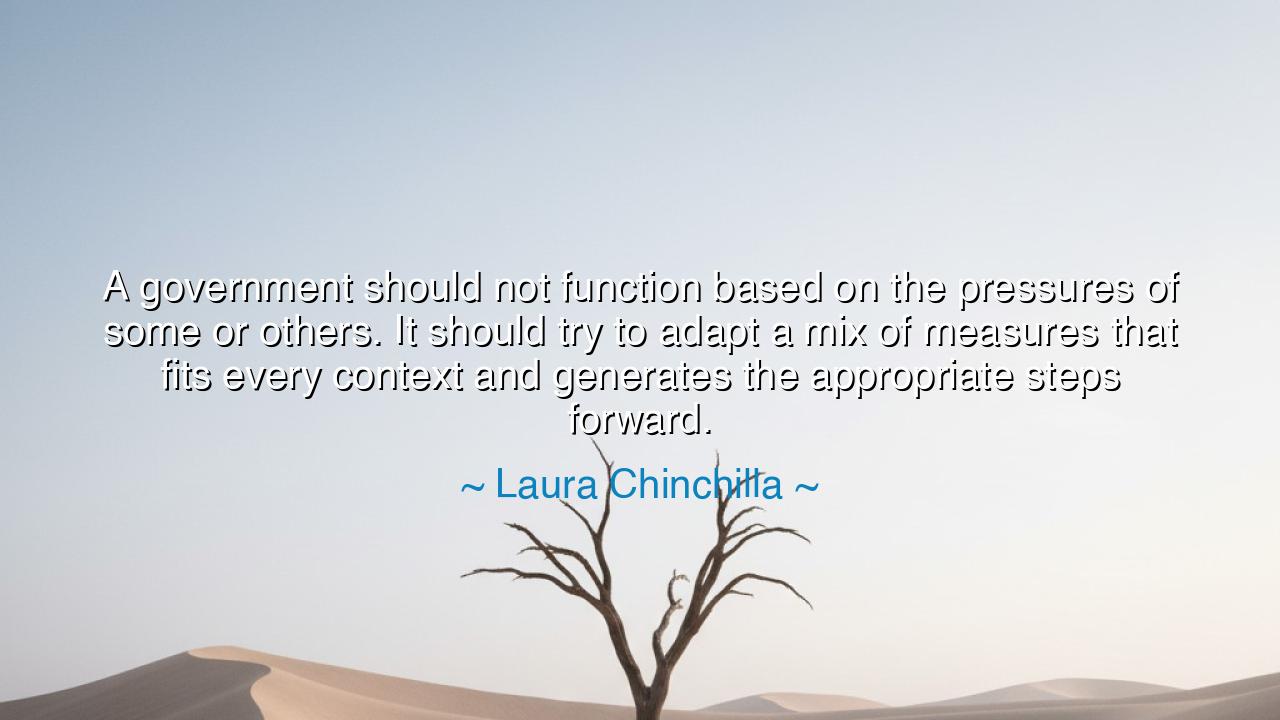
A government should not function based on the pressures of some
A government should not function based on the pressures of some or others. It should try to adapt a mix of measures that fits every context and generates the appropriate steps forward.






When Laura Chinchilla, the former President of Costa Rica, proclaimed, “A government should not function based on the pressures of some or others. It should try to adapt a mix of measures that fits every context and generates the appropriate steps forward,” she spoke not as a ruler seeking to command, but as a leader seeking to balance. Her words, both practical and profound, capture the ancient essence of wise governance — that power must serve all, not merely the loudest or the most privileged. In her voice resounds the eternal struggle of leadership: to resist the clamor of faction and to seek the harmony of justice. For in every age, the temptation of rulers has been to yield to the forces of influence — the wealthy, the popular, or the powerful — rather than to the quiet, enduring call of equity and wisdom.
The origin of this quote lies in Chinchilla’s experience governing a nation celebrated for its peace, stability, and democratic values amid a turbulent region. As Costa Rica’s first female president (2010–2014), she often faced immense political and social pressures, from global economic demands to local activism and the diverse needs of her people. Her words arose from reflection upon those trials — a reminder that government is not a stage for appeasing interests, but a vessel for steering the collective good. She understood that every nation, like every soul, must find its own equilibrium, crafting policies not from passion or pressure but from principle and prudence.
In the style of the ancients, Chinchilla’s message would be understood as a warning against the tyranny of imbalance. For the state, like the human body, thrives on proportion: too much of one element, and health gives way to decay. A government that bends entirely to public outcry becomes chaotic; one that ignores the people becomes despotic. The wise ruler must walk between these extremes, listening yet not being ruled, deciding yet not dictating. The philosopher Aristotle, writing two millennia before, spoke of the same golden mean — the balance between extremes that leads to virtue. Chinchilla’s wisdom stands in that lineage: the call for moderation not as weakness, but as the strength of measured judgment.
History, too, bears witness to her truth. Consider the story of Abraham Lincoln during the American Civil War. He faced unimaginable pressures — abolitionists demanding immediate emancipation, generals urging ruthless war, moderates calling for reconciliation. Had Lincoln yielded entirely to any one of these forces, he would have torn the fragile fabric of the Union. Instead, he sought a mix of measures suited to the moment: firm enough to preserve the nation, yet flexible enough to heal it. His Emancipation Proclamation was not born of haste, but of timing — a decision forged in the fire of principle, tempered by the need for unity. It was this balance that allowed him to guide his people “through the fiery trial” toward freedom and renewal.
In Chinchilla’s wisdom lies a deeper moral truth — that leadership is not submission to passion but service to purpose. The ruler who governs by pressure becomes a puppet, moved by the strings of interest. The ruler who governs by principle becomes a shepherd, guiding even those who resist. Her words remind us that the voice of the people must be heard, but not all voices lead toward light. Some cry out of fear, others from greed, others from anger. The art of government lies not in silencing them, but in discerning the harmony that emerges when justice, reason, and compassion are made to work together.
Her statement also carries a tone of quiet moral courage. To resist pressure is not to reject the people, but to protect them — even from their own momentary passions. In every democracy, there will be tides of emotion: outrage, excitement, demand. The wise leader stands not as a wall against them, but as a compass within them — listening, adapting, and guiding. This is what Chinchilla meant by finding “a mix of measures that fits every context.” It is the skill of governing with empathy but deciding with integrity. Such balance is the highest art of statesmanship, requiring both the humility to listen and the strength to lead.
The lesson of Laura Chinchilla’s words is one of timeless relevance: true leadership requires equilibrium between compassion and conviction. It teaches that neither the roar of the crowd nor the whispers of the powerful should dictate the course of justice. In every sphere of life — government, community, or personal — the same law applies. We must act not from pressure, but from principle; not from reaction, but from reflection. The wise soul, like the wise ruler, does not bend with every wind, but stands rooted in truth while adjusting to the storms of circumstance.
So let her words endure as a teaching for future generations: to govern well is to serve all with balance, to listen deeply but decide rightly. Let every leader — and every citizen — remember that progress is not found in the noise of factions, but in the harmony of reason and justice. For a nation guided by principle becomes a beacon to the world; but a government ruled by pressure becomes a shadow of its people’s better selves. Therefore, let us choose the harder path — the path of wisdom, moderation, and purpose — and by it, take our “appropriate steps forward,” not toward power, but toward peace.






AAdministratorAdministrator
Welcome, honored guests. Please leave a comment, we will respond soon